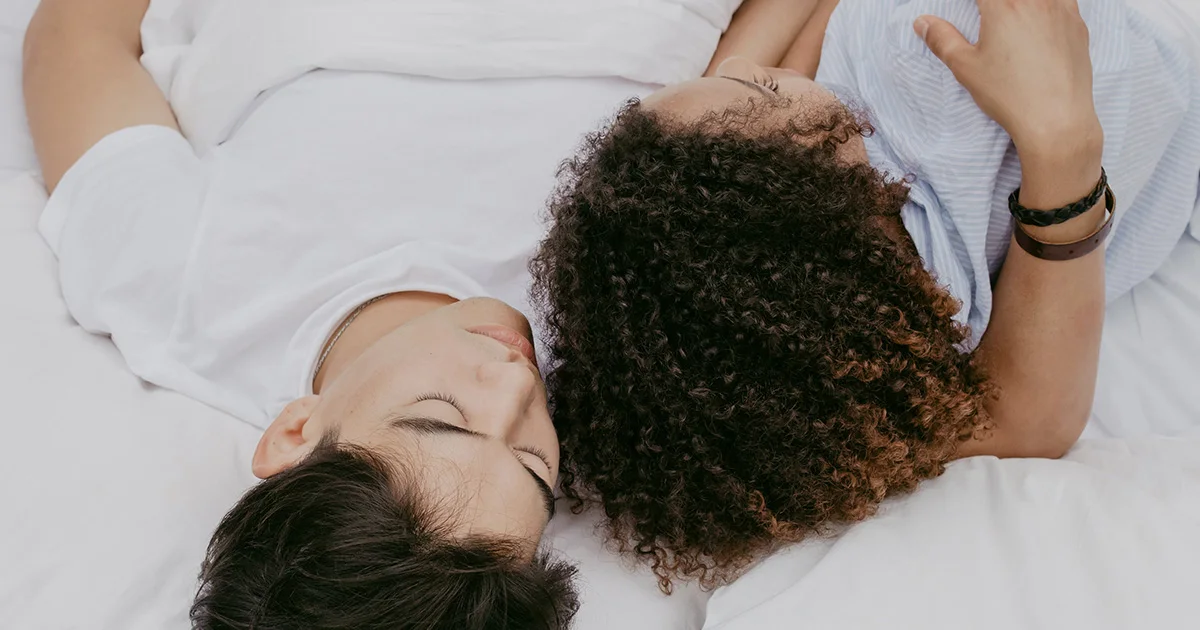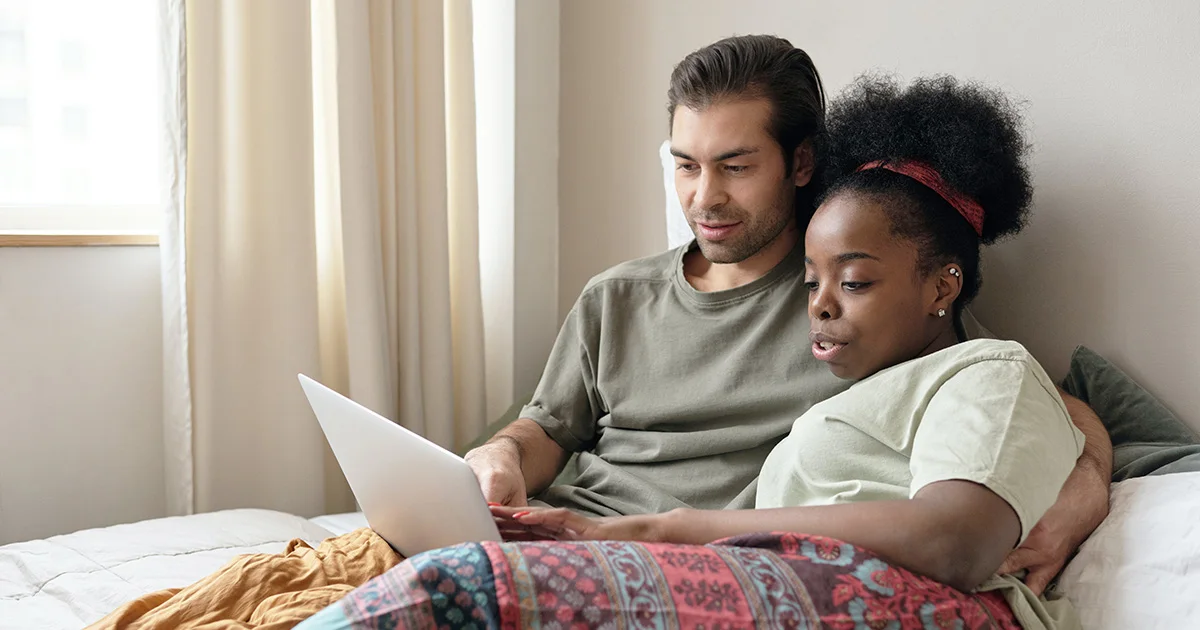How to increase sex drive: what to do when you have low libido

Reviewed by Steve Silvestro, MD, Ro,
Written by Ashley Braun, RD, MPH
last updated: Apr 20, 2021
5 min read
Here's what we'll cover
"Not tonight, honey. I have a headache." If you find yourself saying this sort of thing more than you'd like, you're probably wondering how to increase sex drive. That's especially true if it's causing strain on your sexual relationships.
First thing's first: A normal sex drive looks different for everyone. It's common for some people to have a lower sexual desire than others. But sometimes, changes in desire can make people worry and add unnecessary stress in relationships.
Keep reading to learn some of the causes of low sex drive and steps you can take to increase your sex drive.
Causes of low sex drive
Why might you have a lower desire for sex than you used to? Your sex drive, also called libido, is affected by many other areas of your health and life. When looking for a way to boost your libido, it helps to understand what could be affecting it.
Anxiety and depression
Your mood plays a significant role in your ability to get "in the mood," so your mental health is an excellent place to start.
Depression and lower libido are strongly linked, and pain during sex is 10 times more common in women who have been diagnosed with anxiety (Basson, 2018).
Even without a diagnosis like anxiety or depression, consistently feeling stressed can affect your libido. A stressful job, financial struggles, and any number of other stressors could leave you feeling run down and lacking desire.
Aging
Hormone changes are a natural part of aging, and with these changes, your libido may gradually decline. Research shows that by the age of 60, many people will experience changes in their sex drive. And chronic health conditions common in aging, such as heart disease, chronic obstructive pulmonary disorder (COPD), and diabetes, increase the loss of normal sexual desire and affect sexual satisfaction (Kalra, 2011).
After 30, testosterone levels start to lower in men (Nassar, 2021). Decreased testosterone can reduce sexual desire and potentially affect erectile function (Rizk, 2017).
Women, around the age of 40–50, reach menopause, the natural end of a woman's menstrual cycle. After menopause, estrogen hormone levels drop, causing changes in women's health, sexual interest, and sexual function (Heidari, 2019).
Some of the changes caused by menopause, like vaginal dryness, affect how sex feels. Lubricants may help increase comfort and pleasure if you experience dryness or pain (Heidari, 2019).
Sedentary lifestyle and obesity
Believe it or not, sitting at a desk all day with minimal exercise could be affecting your sex life. There's a link between obesity, a sedentary lifestyle, and lower sex drive in men and women (Esfahani, 2018).
Both physical activity and obesity can impact confidence and body image, adding to lower libido.
Chronic diseases and medications
Medical conditions, like heart disease, diabetes, and high blood pressure, can affect the blood flow to genital areas leading to sexual problems (Merghati-Khoei, 2016).
Prostate cancer has a significant impact on a man's sex life. The prostate is essential to the health of a man's sexual function, and erectile dysfunction is a common side effect of prostate cancer treatment (Hyun, 2012).
Women's sexual interest can be affected by a disorder called hypoactive sexual desire disorder (HSDD). This condition is the loss of desire for sexual activity and sexual fantasies (Parish, 2016).
Low sex drive is a common side effect of many medications. Some antidepressants, birth control pills, blood pressure medications, and antiepileptics could all impact your libido (Merghati-Khoei, 2016).
Relationship satisfaction
The trust and intimacy that you have with your sex partner can affect your desire. Perceived problems in a relationship can change the amount of enjoyment felt and decrease your overall desire for sex.
Even if there aren't perceived problems, changes in sexual desire and sexual frequency are common in long-term relationships.
How to increase sex drive
Low libido is usually a complex problem. Taking the approach of adopting healthy lifestyle changes in multiple areas of your health and well-being helps boost libido. Whether you're wondering how to increase male libido or how to increase sex drive in women, the following tips can help:
Exercise and physical fitness
Participating in regular exercise and finding ways to move more throughout the day could boost your interest in sexual activity. Research shows a link between fitness, body image, and sexual function in men and women (Jiannine, 2018).
For women, exercises and physical therapy to strengthen the muscles around the pelvis—also called the pelvic floor—could help boost satisfaction, sexual activity, and confidence during intercourse (Kanter, 2015).
Stress management
Experiencing consistent high-stress levels impacts your health and sex life in many ways. But there are many stress management techniques and lifestyle changes you can try to help cope with stress and boost your mental health (and some of these may also help increase your sex drive):
Practice mindfulness and meditation
Do some stretching or yoga
Try deep breathing
Go for a walk or workout
Talk to family, friends, or a therapist
Set aside time for hobbies
Improve communication and connection
Focusing on intimacy in your relationship could help to increase desire. Planning date nights, communicating, and spending quality time together outside of the bedroom can help improve your relationship in the bedroom, too.
As uncomfortable as it may be, try talking with your partner about changes in sex drive. Low libido is common, but it doesn't need to create a barrier in your relationship. Communication and trust are essential for building intimacy and having better sex.
If you and your significant other are struggling to connect, consider talking with a sex therapist for a safe space to discuss sexual problems. Therapy can help to rebuild connection and sexual interest, leading to a better sex life.
Get enough sleep
Good quality sleep affects mood, mental health, and energy levels. One study showed sleep quality and consistently getting adequate sleep were related to increased sexual desire in women (Kalmbach, 2015).
Tips for better sleep:
Go to bed and wake up at consistent times
Limit caffeine intake in the afternoons and evenings
Ideally, keep your bedroom dark and at a cooler temperature when you sleep
Exercise regularly, but not too close to when you go to bed
Eat a nutritious diet
Your overall health affects your sex drive. Following a nutritious diet helps maintain your health and could prevent some diseases.
Eating a diet full of vegetables, fruits, whole grains, healthy fats, and lean proteins can help you maintain your health. These health improvements can include improving blood flow and preventing chronic conditions like heart disease and high blood pressure.
Limit alcohol
Excessive alcohol intake can suppress your sex drive, reduce satisfaction, and make it more challenging to perform in the bedroom (Lee, 2010).
Consult with your healthcare provider
If you’re concerned about changes in your libido, talking with a healthcare provider could help. They can provide you with more information about the potential causes of your low libido and offer options to help increase your libido.
In some cases, your doctor can recommend medical treatments to help.
For some men, low testosterone levels are responsible for their low sexual desire and sexual dysfunction. If that is the case, your healthcare provider may recommend testosterone replacement therapy (TRT). TRT can help return energy levels, sex drive, and sexual function to your normal levels.
You may want to visit a healthcare provider if:
You experience a sudden change in your sex drive or erectile dysfunction.
It starts after beginning a new medication.
Sex is painful.
You have other new symptoms.
You are experiencing mental health or relationship problems because of decreased libido.
Herbal supplements and alternative medicines
It can be uncomfortable to discuss problems with sexual drive and function with your healthcare provider. This discomfort can lead many people to seek solutions to try at home, but be careful with products that claim to be aphrodisiacs or boost male performance.
Many herbal remedies and supplements have limited research to support their effects. Some research says herbal remedies could increase sex drive, but there is little evidence showing any effects on humans (Chauhan, 2014).
There’s help available for low libido
If you’re dealing with low libido, it’s important to speak with your healthcare provider. Try the techniques we’ve mentioned (they can’t hurt anyway!) but remember that there may be other options available to you.
DISCLAIMER
If you have any medical questions or concerns, please talk to your healthcare provider. The articles on Health Guide are underpinned by peer-reviewed research and information drawn from medical societies and governmental agencies. However, they are not a substitute for professional medical advice, diagnosis, or treatment.
Basson, R., & Gilks, T. (2018). Women's sexual dysfunction associated with psychiatric disorders and their treatment. Women's Health (London, England) , 14 , 1745506518762664. doi: 10.1177/1745506518762664. Retrieved from https://www.ncbi.nlm.nih.gov/pmc/articles/PMC5900810/
Chauhan, N. S., Sharma, V., Dixit, V. K., & Thakur, M. (2014). A review on plants used for improvement of sexual performance and virility. BioMed research international, 2014 , 868062. doi: 10.1155/2014/868062. Retrieved from https://www.ncbi.nlm.nih.gov/pmc/articles/PMC4151601/
Esfahani, S. B. & Pal, S. (2018). Obesity, mental health, and sexual dysfunction: A critical review. Health Psychology Open, 5 (2). doi: 10.1177/2055102918786867. Retrieved from https://www.ncbi.nlm.nih.gov/pmc/articles/PMC6047250/
Heidari, M., Ghodusi, M., Rezaei, P., Abyaneh, SK., Sureshjani, EH., & Sheikhi, RA. (2019). Sexual Function and Factors Affecting Menopause: A Systematic Review. Journal of Menopausal Medicine, 25 (1), 15-27. doi: 10.6118/jmm.2019.25.1.15. Retrieved from https://www.ncbi.nlm.nih.gov/pmc/articles/PMC6487288/
Hyun, J. S. (2012). Prostate cancer and sexual function. World Journal of Mens Health; 30 (2):99-107. doi: 10.5534/wjmh.2012.30.2.99. Retrieved from https://pubmed.ncbi.nlm.nih.gov/23596596/
Jiannine, L. M. (2018). An investigation of the relationship between physical fitness, self-concept, and sexual functioning. Journal of Education and Health Promotion, 57 (7). doi: 10.4103/jehp.jehp_157_17. Retrieved from https://www.ncbi.nlm.nih.gov/pmc/articles/PMC5963213/
Kalmbach, D. A., Ardent, J. T., Pillai, V., & Ciesla, J. A. (2015). The impact of sleep on female sexual response and behavior: A pilot study. Journal of Sexual Medicine, 12 , 1221-1232. doi: 10.1111/jsm.12858. Retrieved from https://deepblue.lib.umich.edu/bitstream/handle/2027.42/111751/jsm12858.pdf?sequence=1&isAllowed=y
Kalra, G., Subramanyam, A., & Pinto, C. (2011). Sexuality: Desire, activity, and intimacy in the elderly. Indian Journal of Psychiatry, 53 (4), 300-306. doi: 10.4103/0019-5545.91902. Retrieved from https://www.ncbi.nlm.nih.gov/pmc/articles/PMC3267340/
Kanter, G., Rogers, R. G., Pauls, R. N., Kammerer-Doak, D., & Thakar, R. (2015). A strong pelvic floor is associated with higher rates of sexual activity in women with pelvic floor disorders. International Urogynecology Journal , 26 (7), 991–996. doi: 10.1007/s00192-014-2583-7. Retrieved from https://www.ncbi.nlm.nih.gov/pmc/articles/PMC4573594/
Lee, A. C. K., Ho, L. M., Yip A. W. C., Fan, S., & Lam, T. H. (2010). The effect of alcohol drinking on erectile dysfunction in Chinese men. The International Journal of Impotence Research, 22 (4), 272-278. doi: 10.1038/ijir.2010.15. Retrieved from https://pubmed.ncbi.nlm.nih.gov/20555344/ .
Merghati-Khoei, E., Pirak, A., Yazdkhasti, M., & Rezasoltani, P. (2016). Sexuality and elderly with chronic diseases: A review of the existing literature. Journal of Research in Medical Sciences : The Official Journal of Isfahan University of Medical Sciences, 21 , 136. doi: 10.4103/1735-1995.196618. Retrieved from https://www.ncbi.nlm.nih.gov/pmc/articles/PMC5348839/
Nassar, G. N. & Leslie, S. W. (2021). Physiology, testosterone. [Updated 2021 Jan 9]. In: StatPearls [Internet]. Retrieved on Apr. 20, 2021 from https://www.ncbi.nlm.nih.gov/books/NBK526128/ .
Parish, S. J. & Hahn, S. R. (2016). Hypoactive sexual desire disorder: a review of epidemiology, biopsychology, diagnosis, and treatment. Sexual Medicine Review;4 (2):103-120. doi: 10.1016/j.sxmr.2015.11.009. Retrieved from https://pubmed.ncbi.nlm.nih.gov/27872021/
Rizk, P. J., Kohn, T. P., Pastuszak, A. W., & Khera, M. (2017). Testosterone therapy improves erectile function and libido in hypogonadal men. Current Opinion in Urology, 27 (6), 511–515. doi: 10.1097/MOU.0000000000000442. Retrieved from https://www.ncbi.nlm.nih.gov/pmc/articles/PMC5649360/










